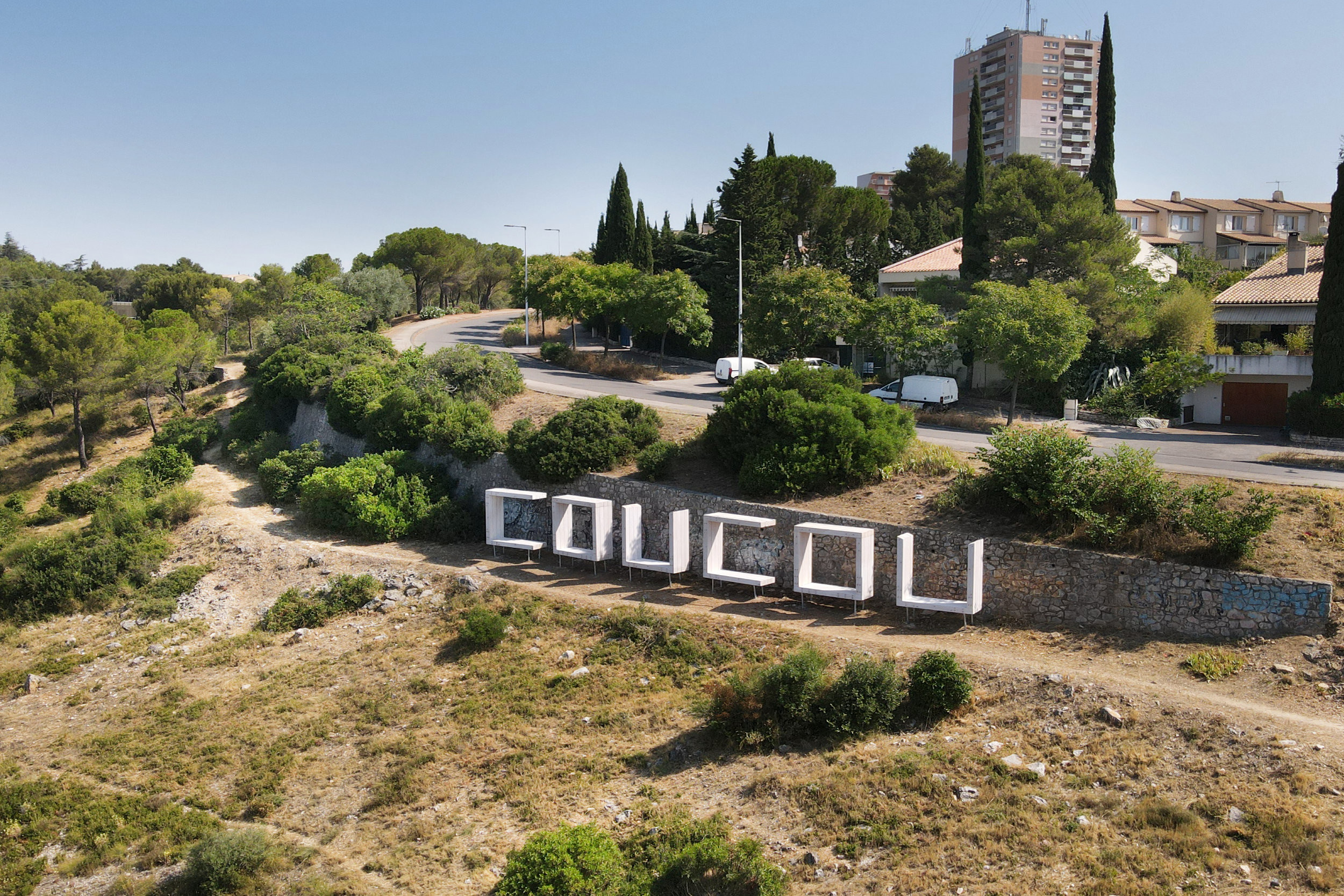
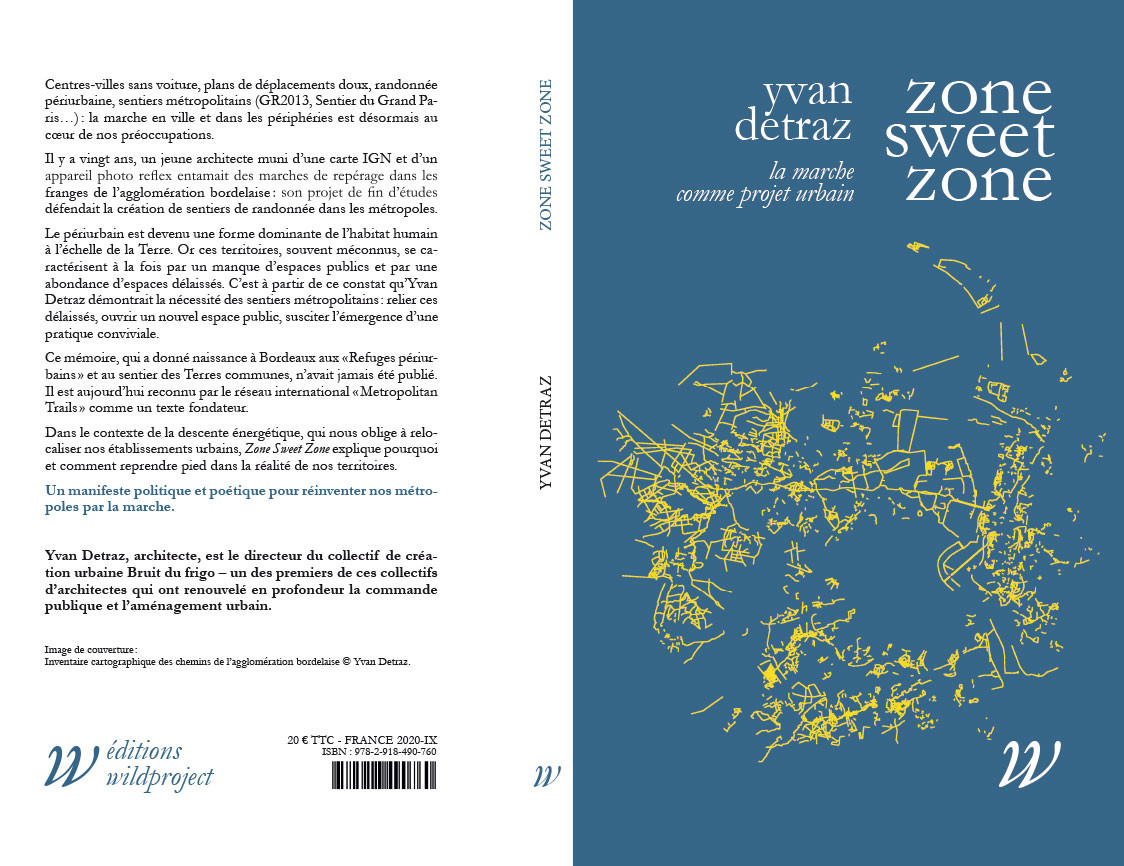
In this unpublished text from 1999, written as part of a graduation diploma, the architect Yvan Detraz proposed a manifesto of these emerging practices.
A political and poetic manifesto to renew suburban territories
Car-free city centres, gentle travel plans, suburban hiking, metropolitan trails (GR2013, Greater Paris Trail…): walking in the city and its outskirts is now at the heart of our concerns.
Twenty years ago, a young architect equipped with an IGN map and a reflex camera began exploratory walks in the fringes of the Bordeaux urban area: his graduation project defended the creation of hiking trails in the metropolis.
The suburb has become a dominant form of human habitation on an Earth-wide scale. Yet these territories, which are often little known, are characterized both by a lack of public spaces and by an abundance of neglected spaces. It is from this observation that Yvan Detraz demonstrated the need for metropolitan trails: to connect these neglected spaces, to open up a new public space, and to encourage the emergence of a user-friendly practice.
This work, which gave birth in Bordeaux to the “Suburban shelters” and the Common Lands trail, had never been published. It is now recognized by the international network “Metropolitan Trails” as a founding text.
In the context of the energy decrease, which forces us to relocate our urban settlements, Zone Sweet Zone explains why and how to regain a foothold in the reality of our territories.
Text extracted from the publisher’s press kit.
Suburban Walks
An extraordinary journey
into the ordinariness of our contemporary cities
A dive into the urban interstices
The Suburban Walks are exploratory walks through the outskirts of the cities. They cross and connect hybrid and fragmented landscapes, composed of housing estates, social housing complexes, old towns, expressways, industrial and commercial areas, car parks and electricity pylons, but also unexpected parks and gardens, forgotten forests, old paths and especially uncountable abandoned spaces where wild nature develops, out of sight. This diffuse and involuntary nature represents a tremendous potential for escape and resourcing, a kind of exoticism of proximity.
The suburbs, a land of adventure and exploration
The suburban area has developed to respond effectively to our modern needs for housing, travel, consumption and production.
The resulting chaotic urbanism is often considered useful but uninteresting, and above all devoid of the qualities that make up the city and the pleasures it provides.
However, the urban outskirts have richness to reveal, resources that could change our viewpoint and practices, and build a sense of suburbanity : a huge territory, a great diversity of landscapes, an unsuspected architectural heritage…
Could we not, from this point of view, consider the suburban area as a land of adventure and exploration, like the great natural spaces ? And imagine hiking in the outskirts as we do in the mountains or in the countryside ?
The suburbs offer a new hiking experience. The hybrid and eclectic nature of the territories crossed, where places, atmospheres and sounds follow one another like a continuous zapping, constantly stimulates our senses and gives the walk a new dynamic.
The origin of the project
In 1999, Yvan Detraz, then an architecture student and co-founder of Bruit du frigo, led a 3-month, 1000 km walking expedition through the Bordeaux suburbs to map neglected spaces and paths. Before Google map and with the help of a simple geographical map, this mission sought to reveal the potential for escape from the Bordeaux suburbs and to develop a walking culture. (see “Zone sweet zone”).
It is from this founding experience that the concepts of the Suburban Walk and the Suburban Refuge were born.
If in 1999, nobody imagined hiking in the middle of the housing estates or along the ring road, today more and more curious people want to discover their city differently by venturing off the beaten track.
The collective suburban walks that we organise around Bordeaux bring together a large and eclectic public : families, students, walking clubs, seniors… The Suburban Shelters, which offer a unique immersive experience, are also very successful.
It is to respond to this search for exoticism of proximity and to share our knowledge of the territory and its hidden treasures that we have created the Common Land Trail.
The Metropolitan Trails Network
The Common Lands Trail of Bordeaux is a member of the Metropolitan Trails Network, created in 2017 in Marseille, on the occasion of the exhibition about the Metropolitan Trails organized at the Mucem Museum (as part of the permanent exhibition “Connectivities”).
This national network (Paris, Marseille, Bordeaux, Avignon) was created as a continuation of the international Metropolitan Trails network (Milan, London, Cologne, Istanbul, New York…) initiated and piloted by Baptiste Lanaspeze (editor – Editions Wildproject) and Paul-Hervé Lavessière (Geographer).
The first National Assises of the Metropolitan Trails were organised on 8 November 2018 at the Mucem in Marseille.
” The Metropolitan Trails are public spaces of a new kind. Transport infrastructures, tourist facilities, off-wall cultural centres, citizen platforms, training areas… they allow us to rediscover our living spaces and to foster the emergence of a common culture.
Urban hiking is a social phenomenon, a deep-rooted movement. Coming from the worlds of art and planning, it now interests a large public.
Metropolitan trails are an international innovation, born in France. »
Extract from the website : National Network of Metropolitan Trails

Exhibition Nouvelles Saisons, arc en rêve centre d'architecture

The Gleaners
French Vexin Regional Nature Park
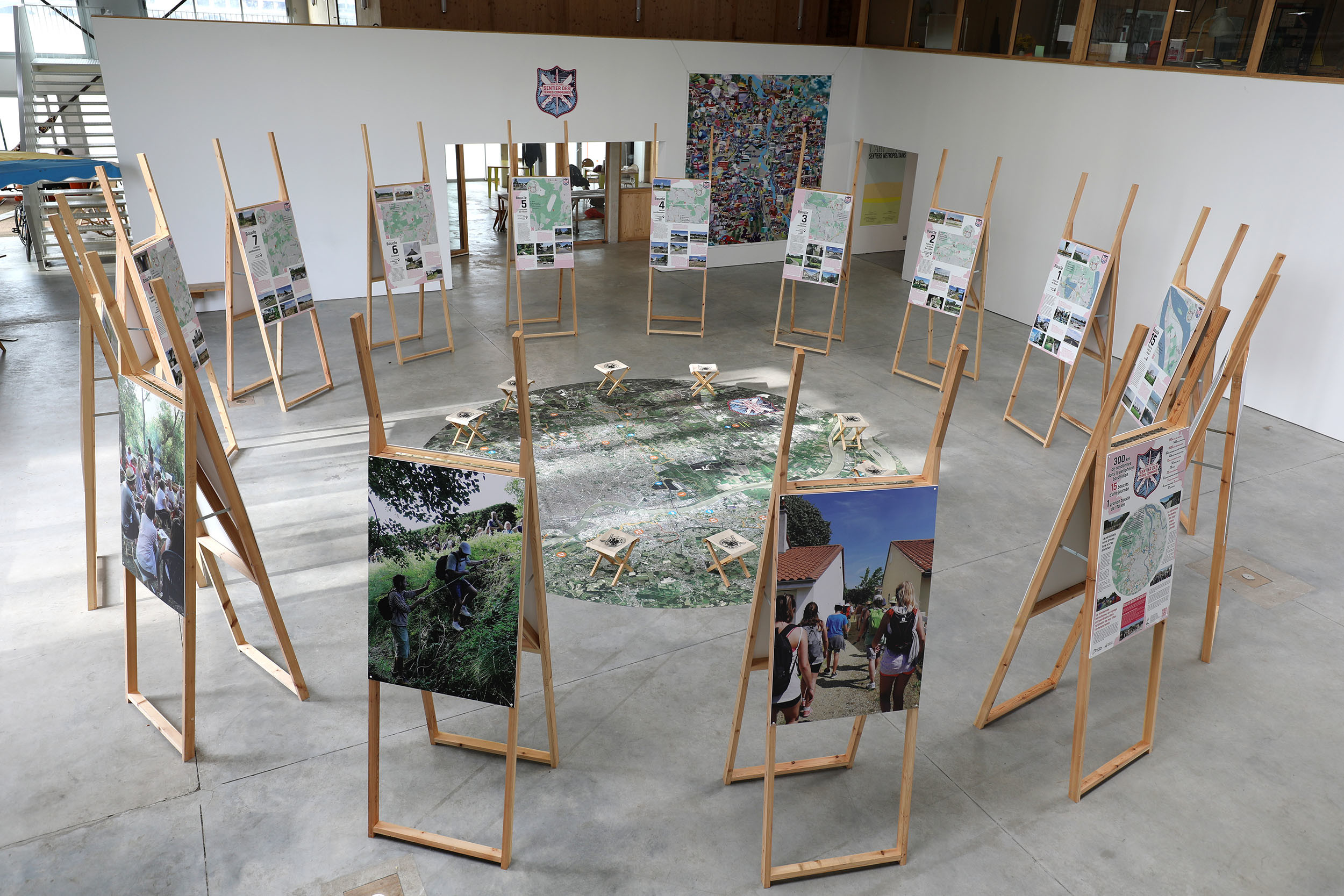
Common lands trail & Art of metropolitan trails
Cross-exhibitions Bordeaux

Hyderabad Urban Trail
Hyderabad – India

Dérive droite
The Walks of panOramas Floirac, Cenon, Lormont, Carbon-Blanc, Bassens

Zone Sweet Zone
Walk as urban project Bordeaux

Moving grouped
Bordeaux, Lormont

Walk around the Shelters #10
Le Haillan > Saint-Médard-en-Jalles
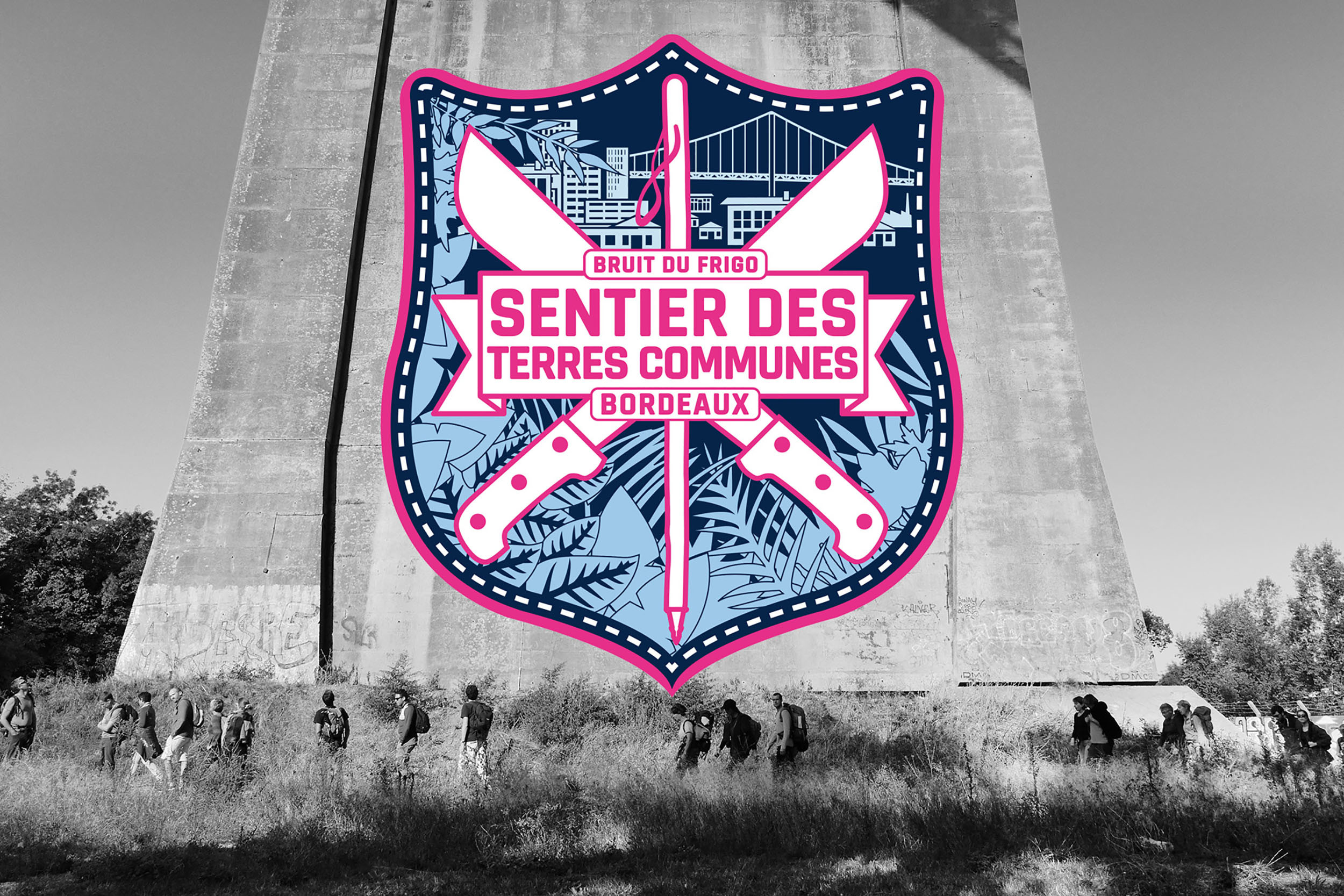
Common Lands Trail
Great Bordeaux
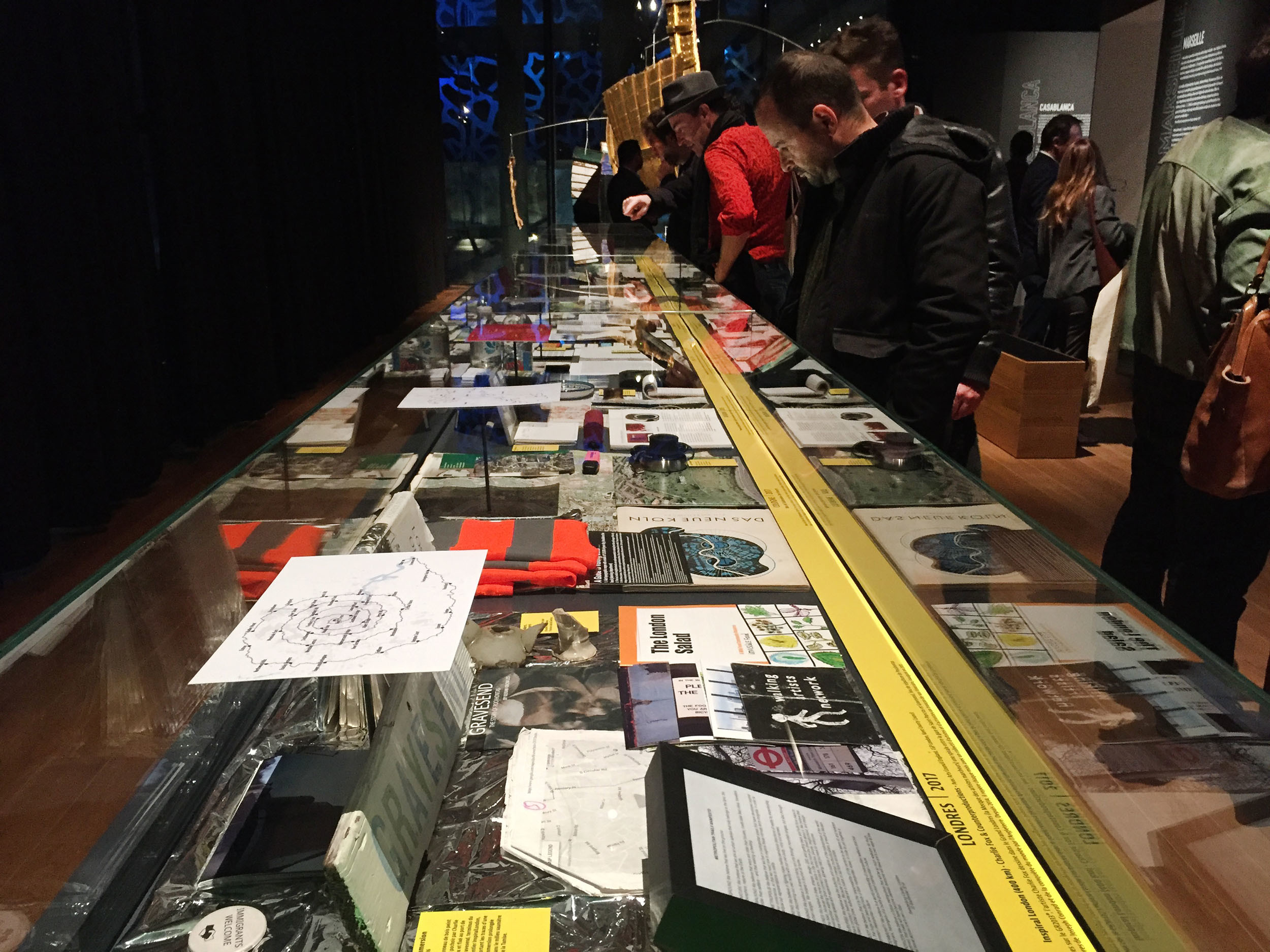
The Common Lands Trail at the Mucem
Marseille
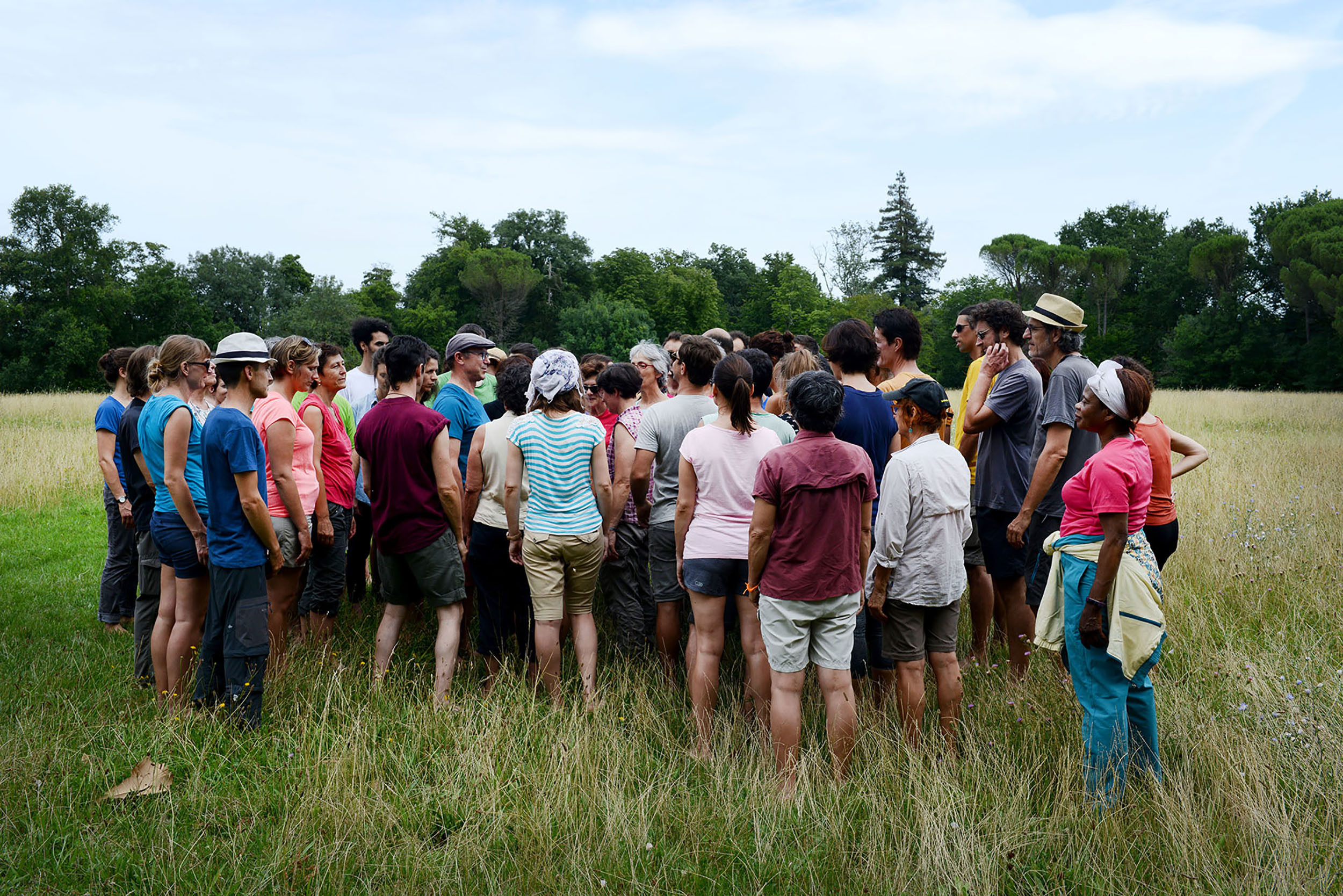
AtTEnTIOn à La mArcHE !
Bordeaux
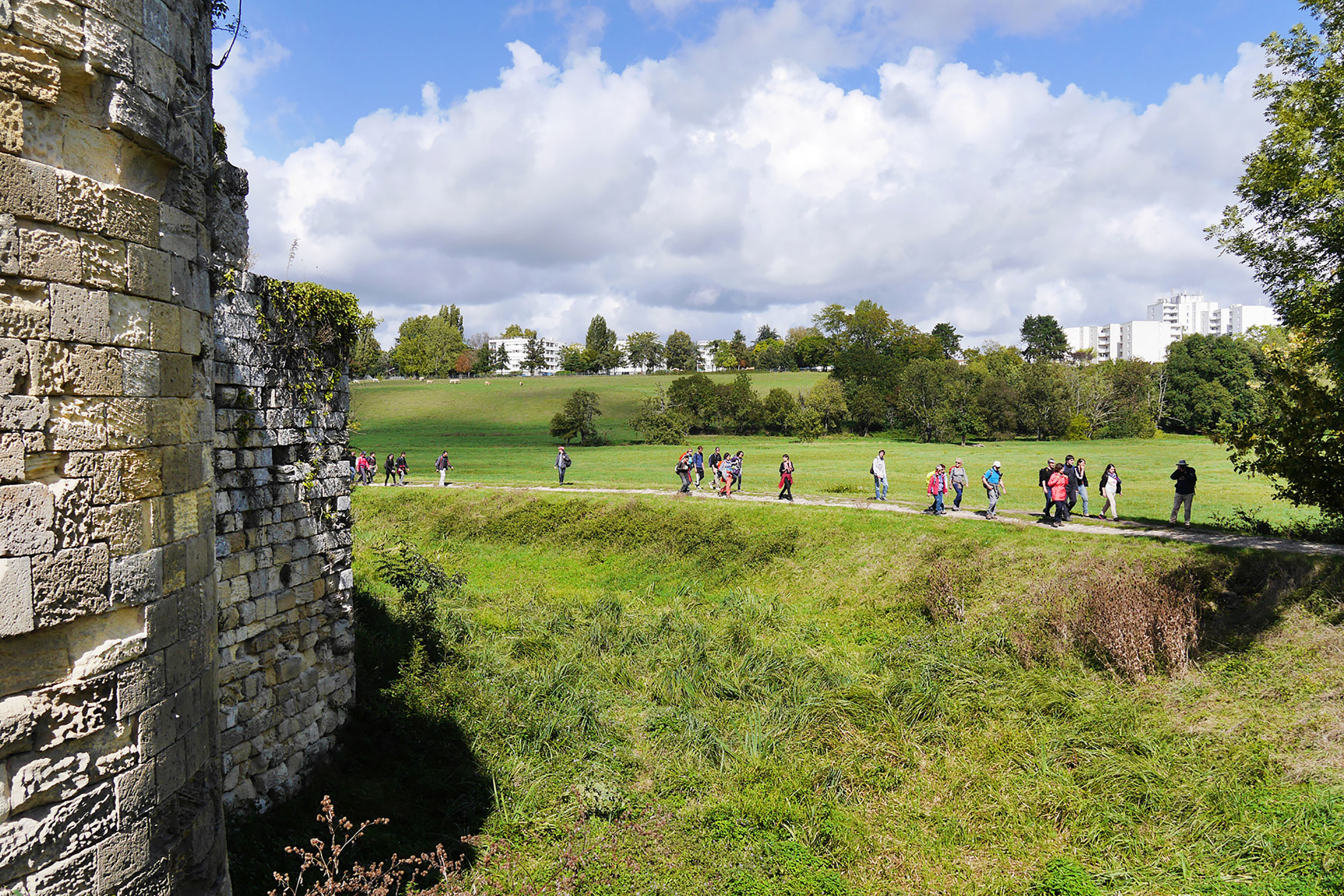
Walk around the Shelters #9
Le Haillan > Bruges
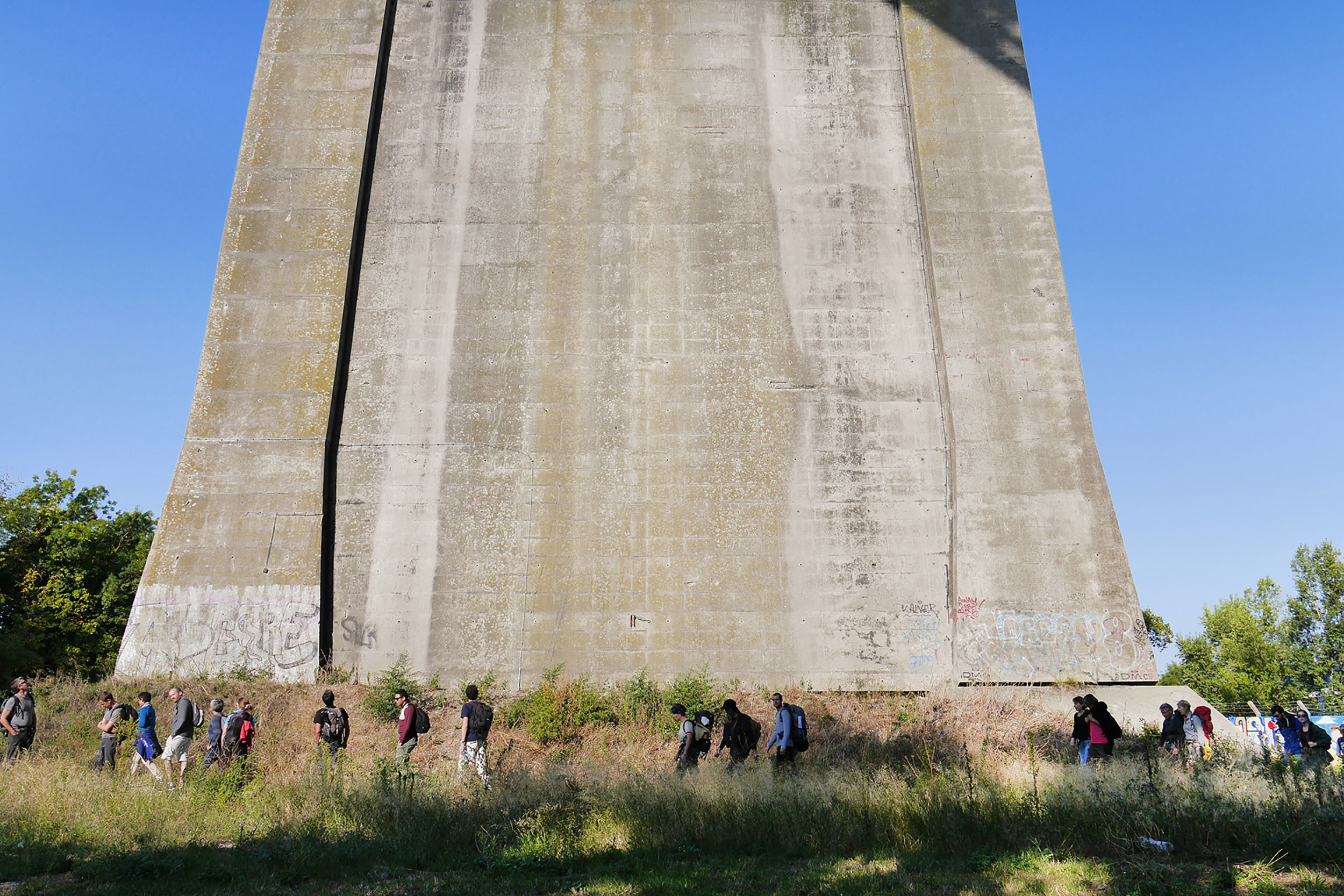
Walk around the Shelters #8
Lormont > Ambares-et-Lagrave

Walk around the Shelters #7
Floirac > Bassens
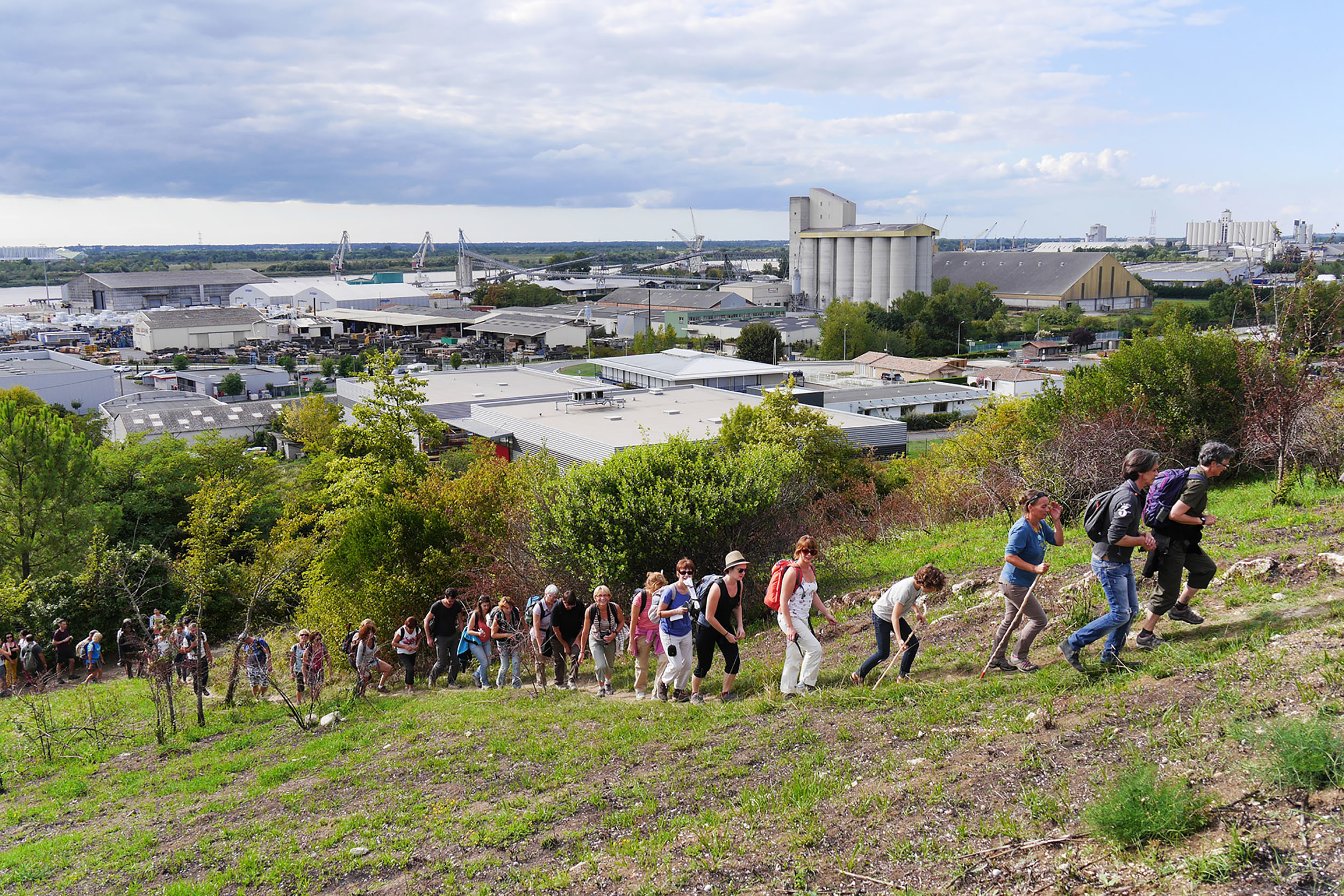
Walk around the Shelters #6
Lormont > Saint-Vincent-de-Paul
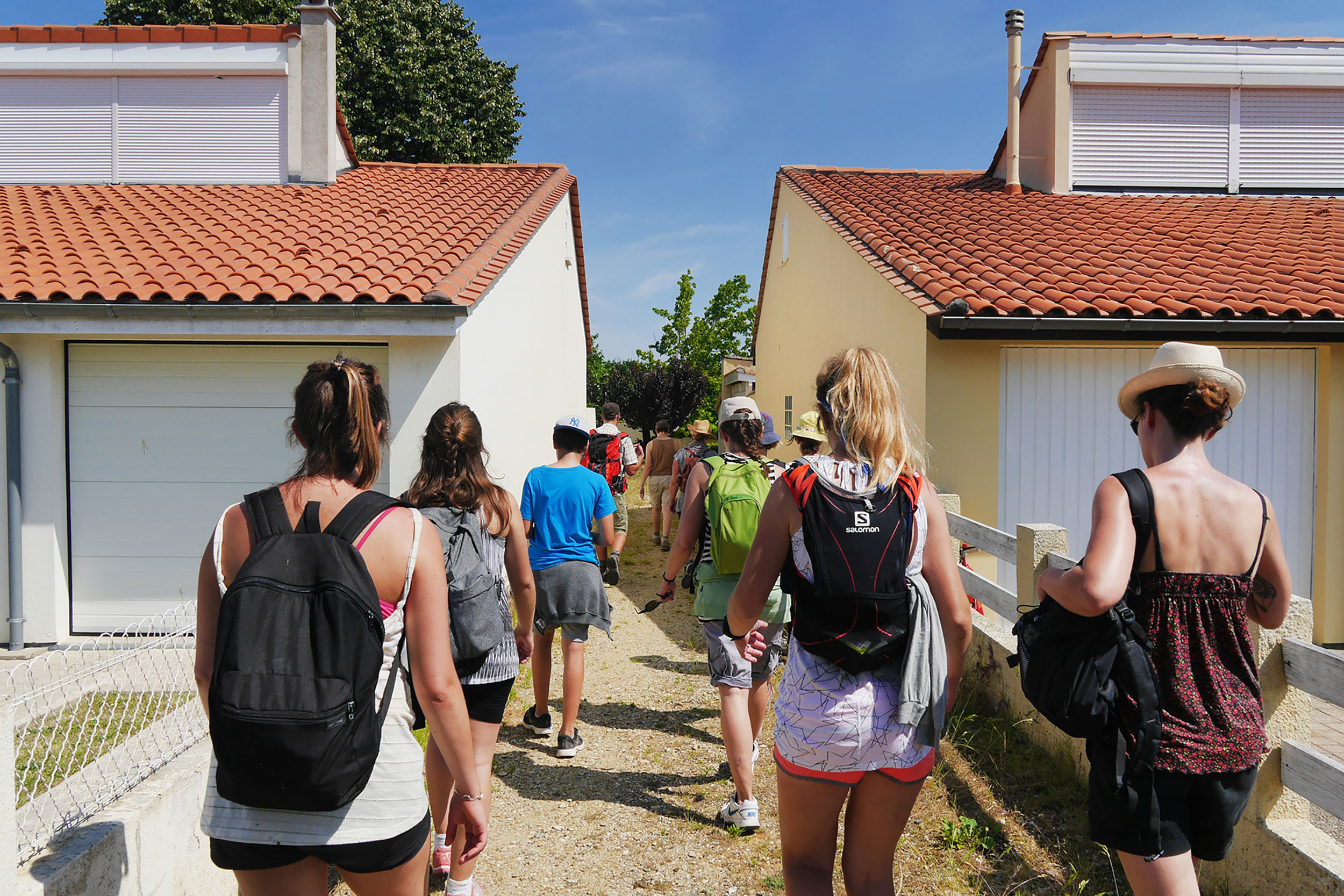
Walk around the Shelters #5
Pessac > Floirac

Tournée générale
Pau

Secret expedition
Lormont

Walk around the Shelters #4
Martignas-sur-Jalle > Bordeaux
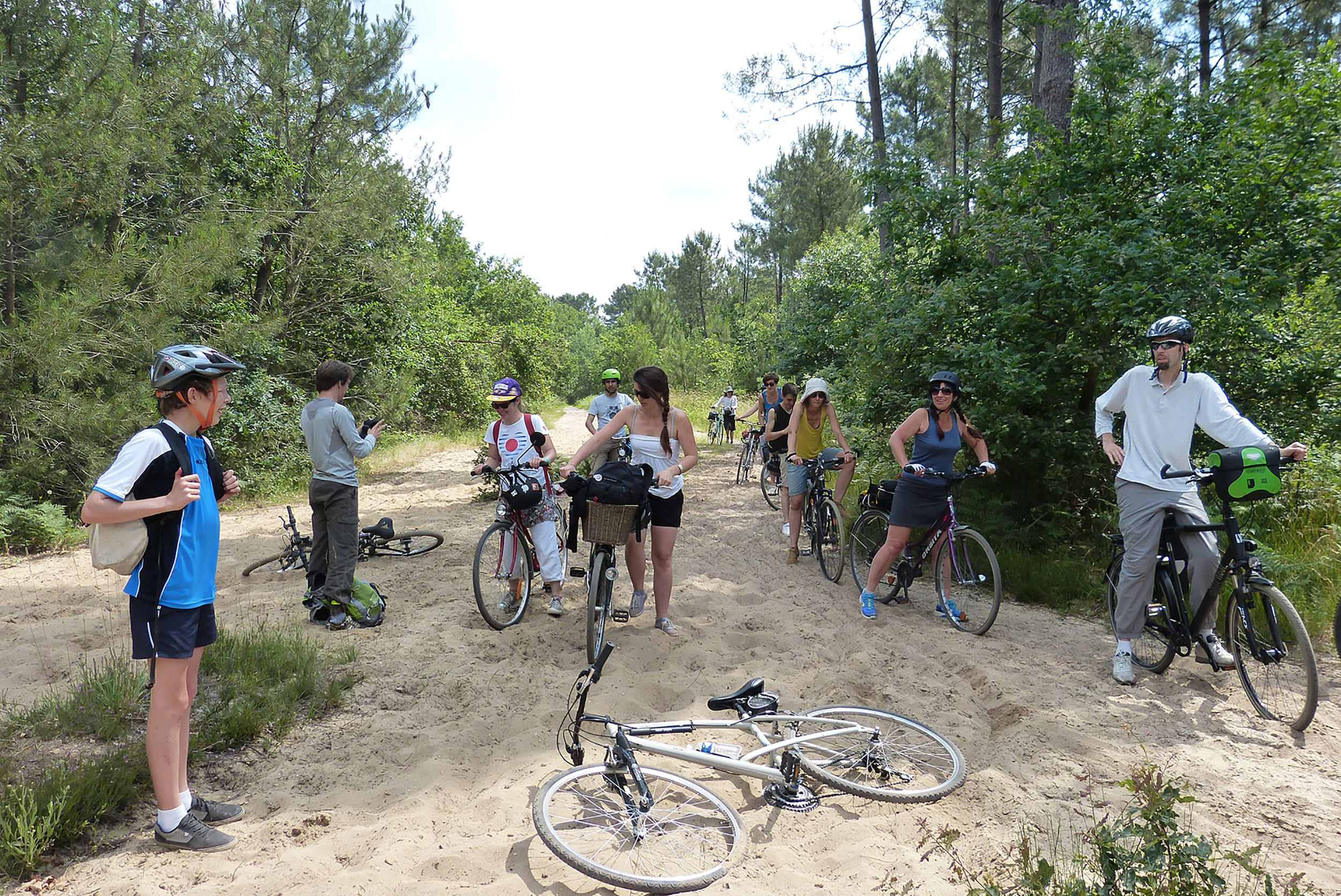
Walk around the Shelters #3
Around the CUB, left bank
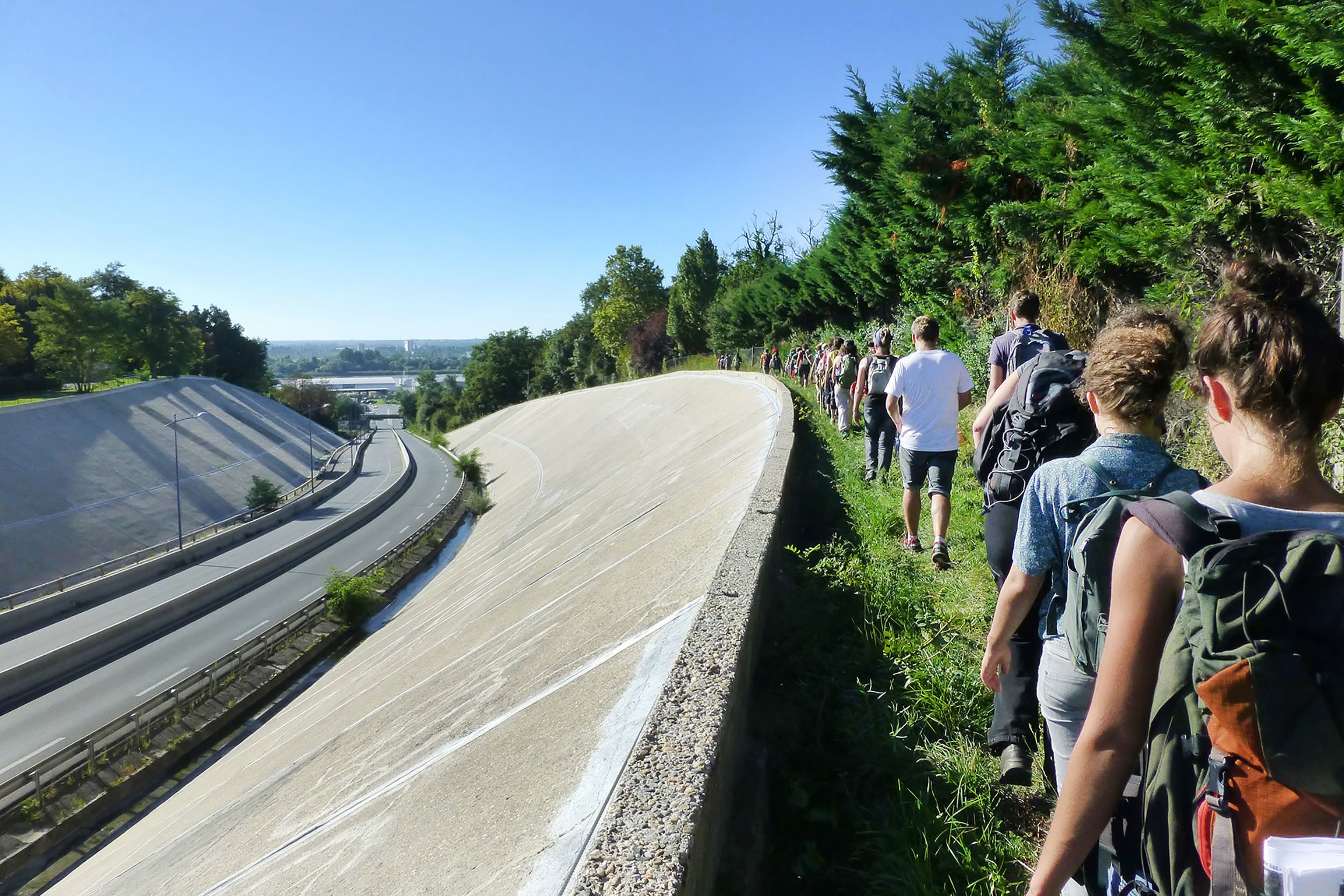
Walk around the Shelters #2
Ambes > Lormont
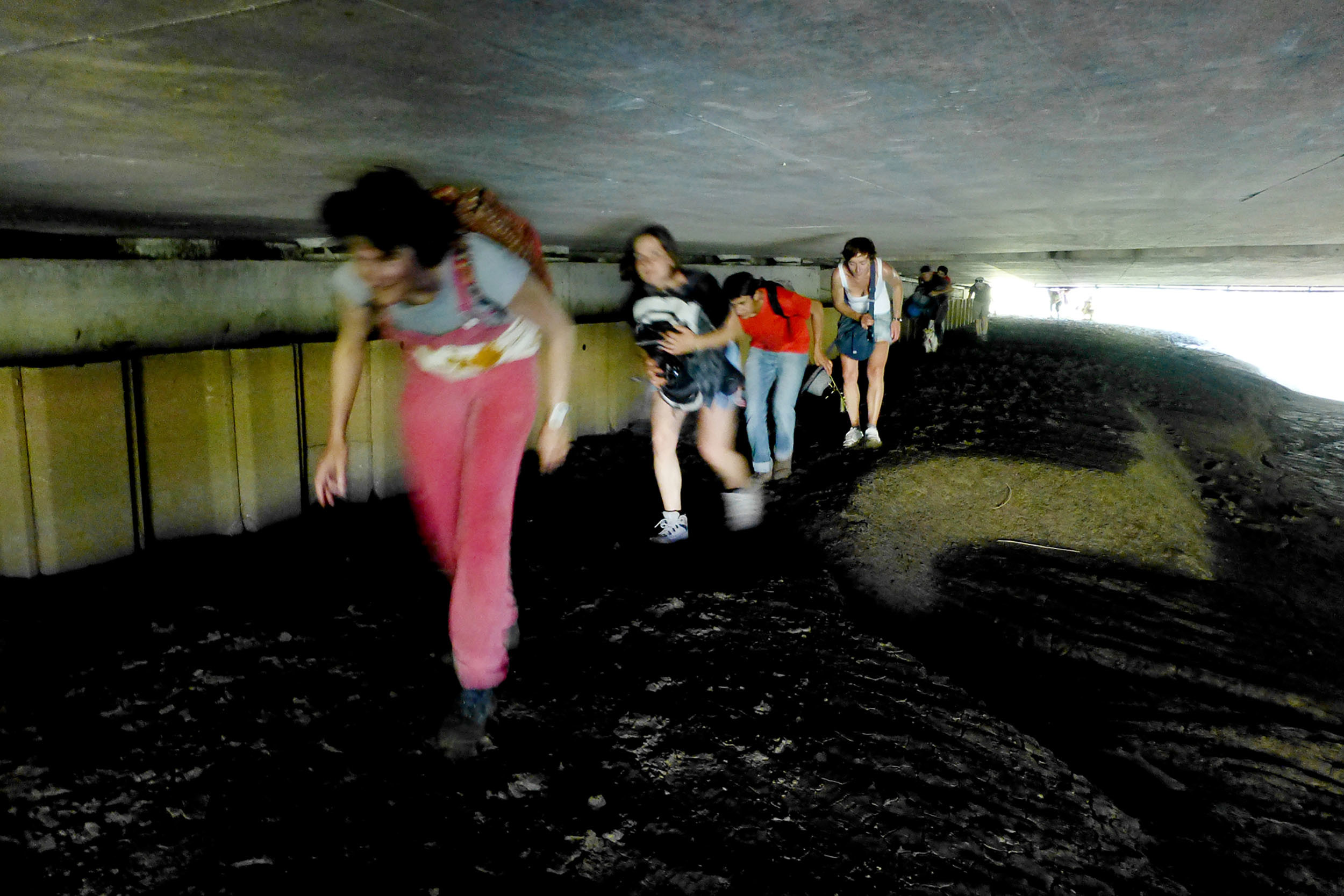
Walk around the Shelters #1
Gradignan > Bègles
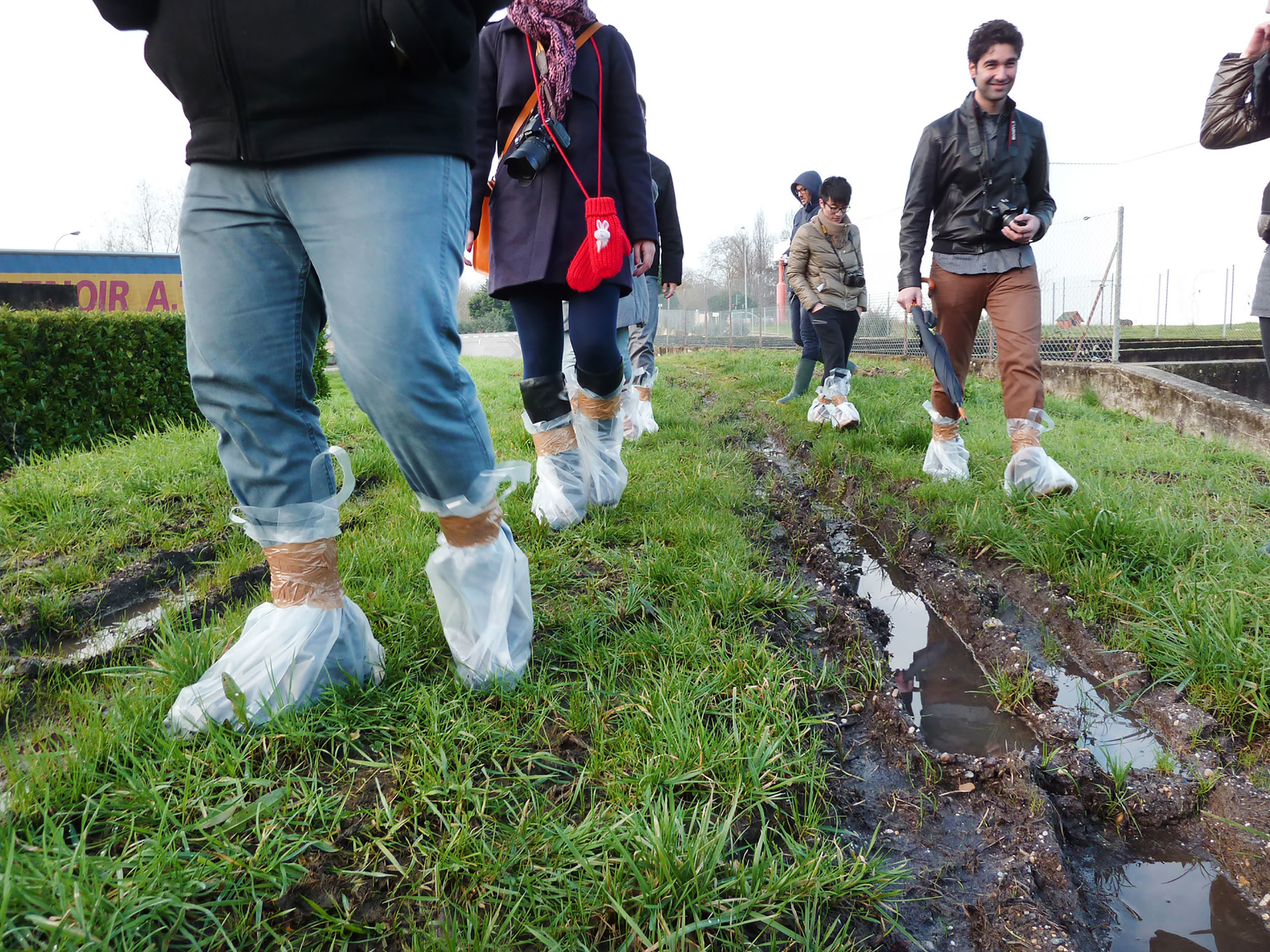
Rocade walk
Bègles

Guest Garden
Royan
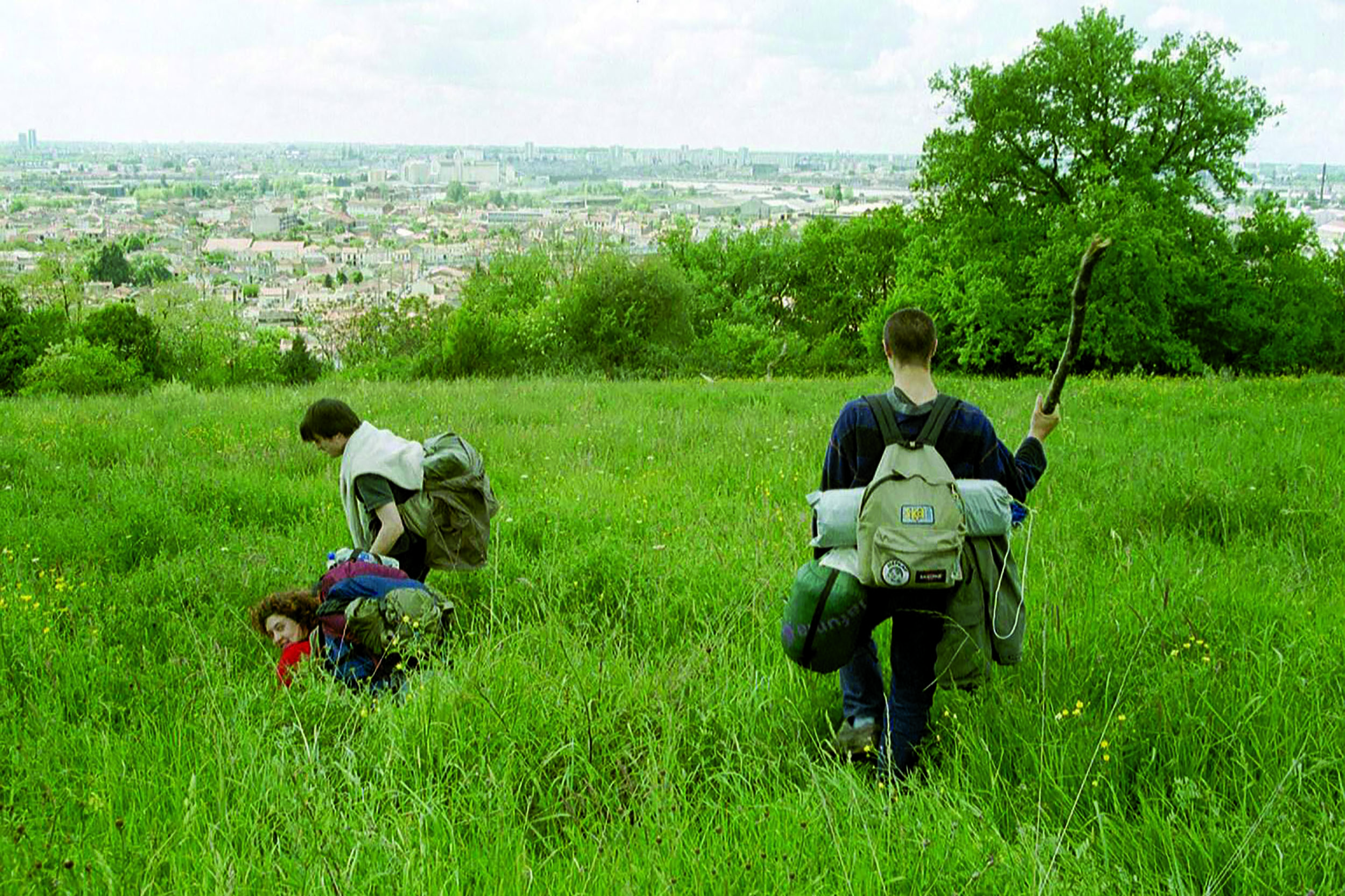
The crossing of the hillsides of Bordeaux
Floirac > Bassens
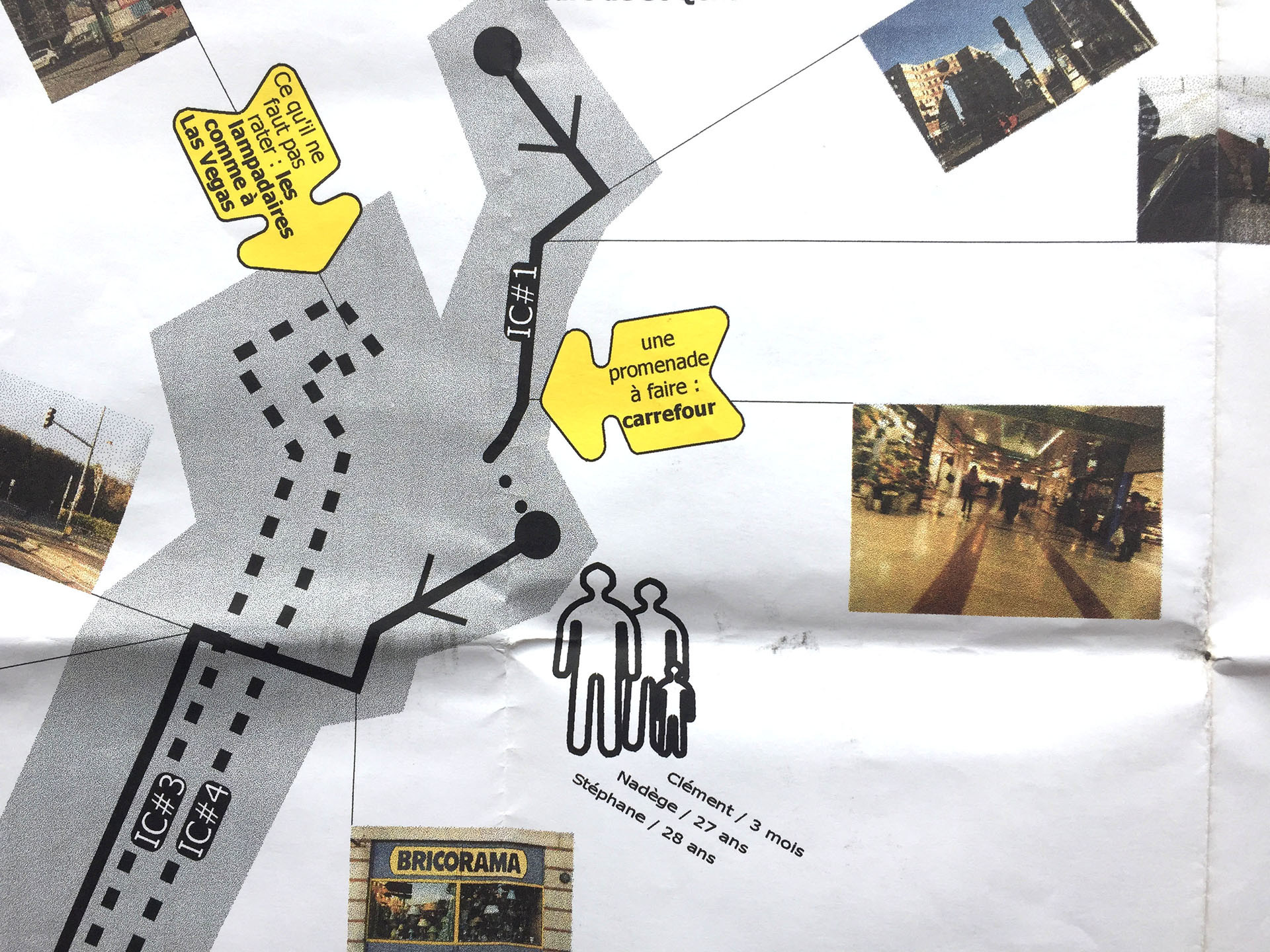
Suggested itineraries
Saint-Quentin-en-Yvelines
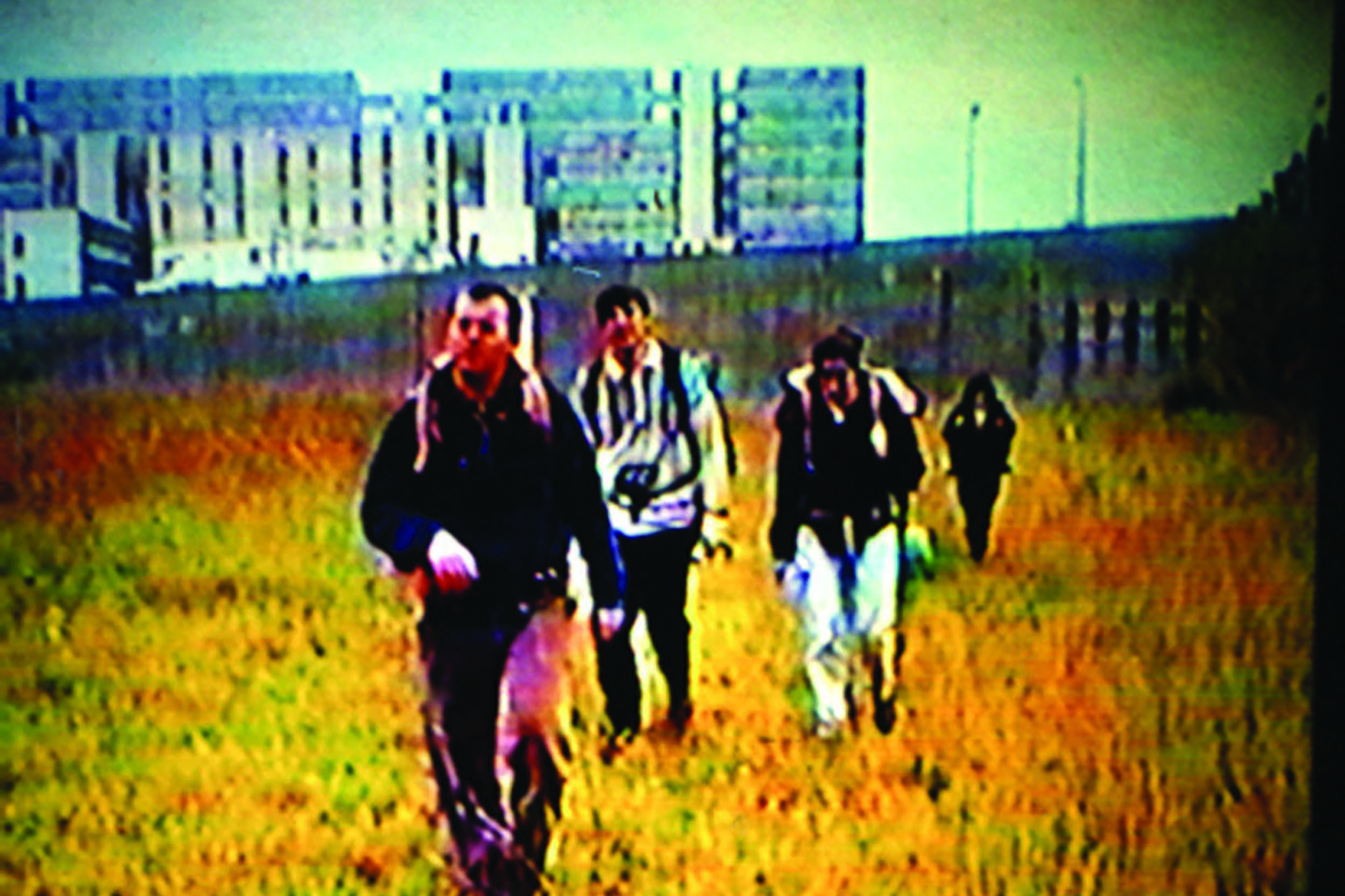
The Tour of Bordeaux
Bordeaux periphery, left bank

Zone Sweet Zone
Bordeaux outskirts
Last
projects
> all projectsAt the crossroads of art, territories and populations, our approach aims to promote the transition to sustainable, shared and welcoming cities, by proposing alternative ways of imagining and building our living environment and by exploring new forms of public space.
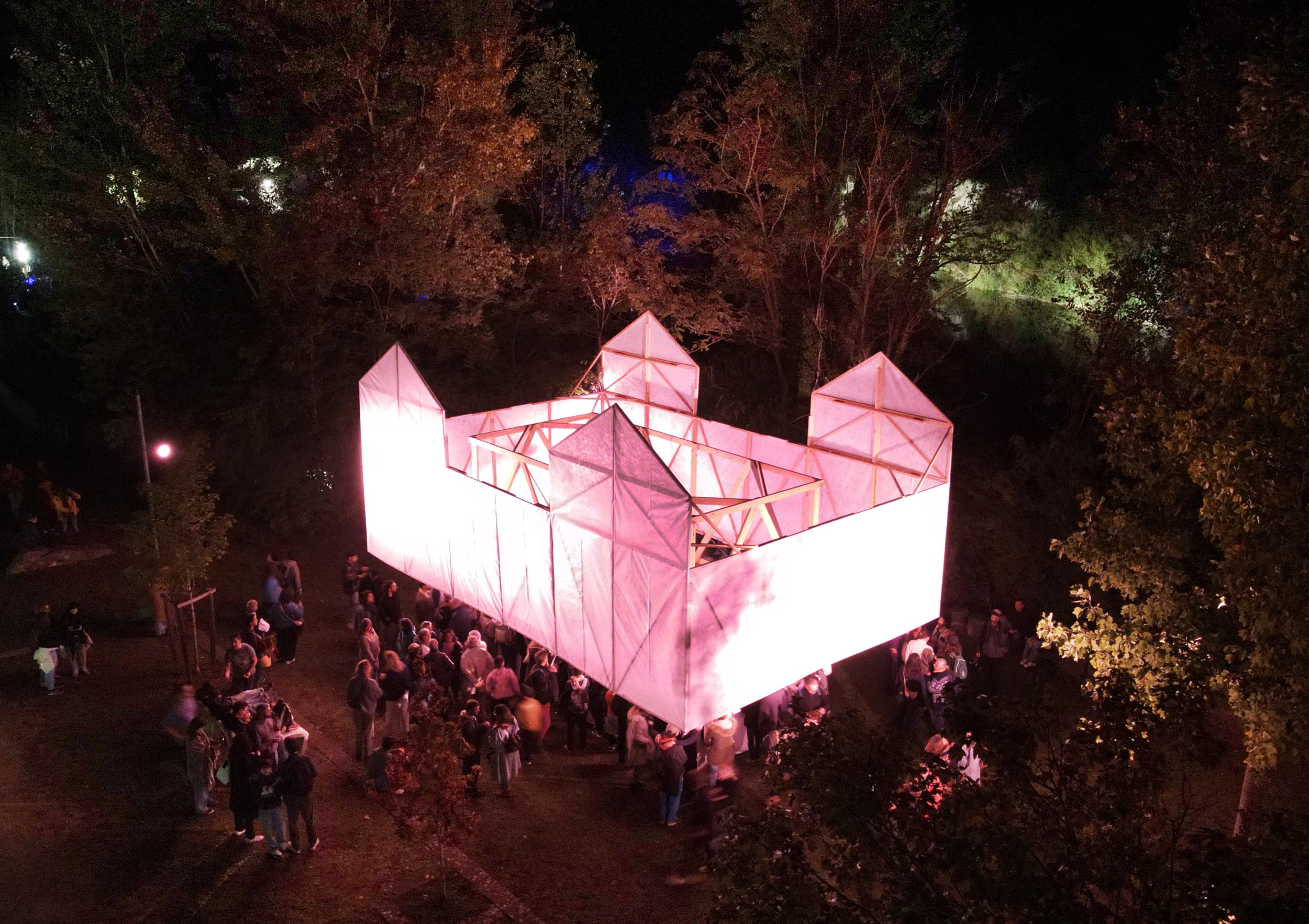
Praline castle
La Nuit Verte, biennale de panoramas Lormont
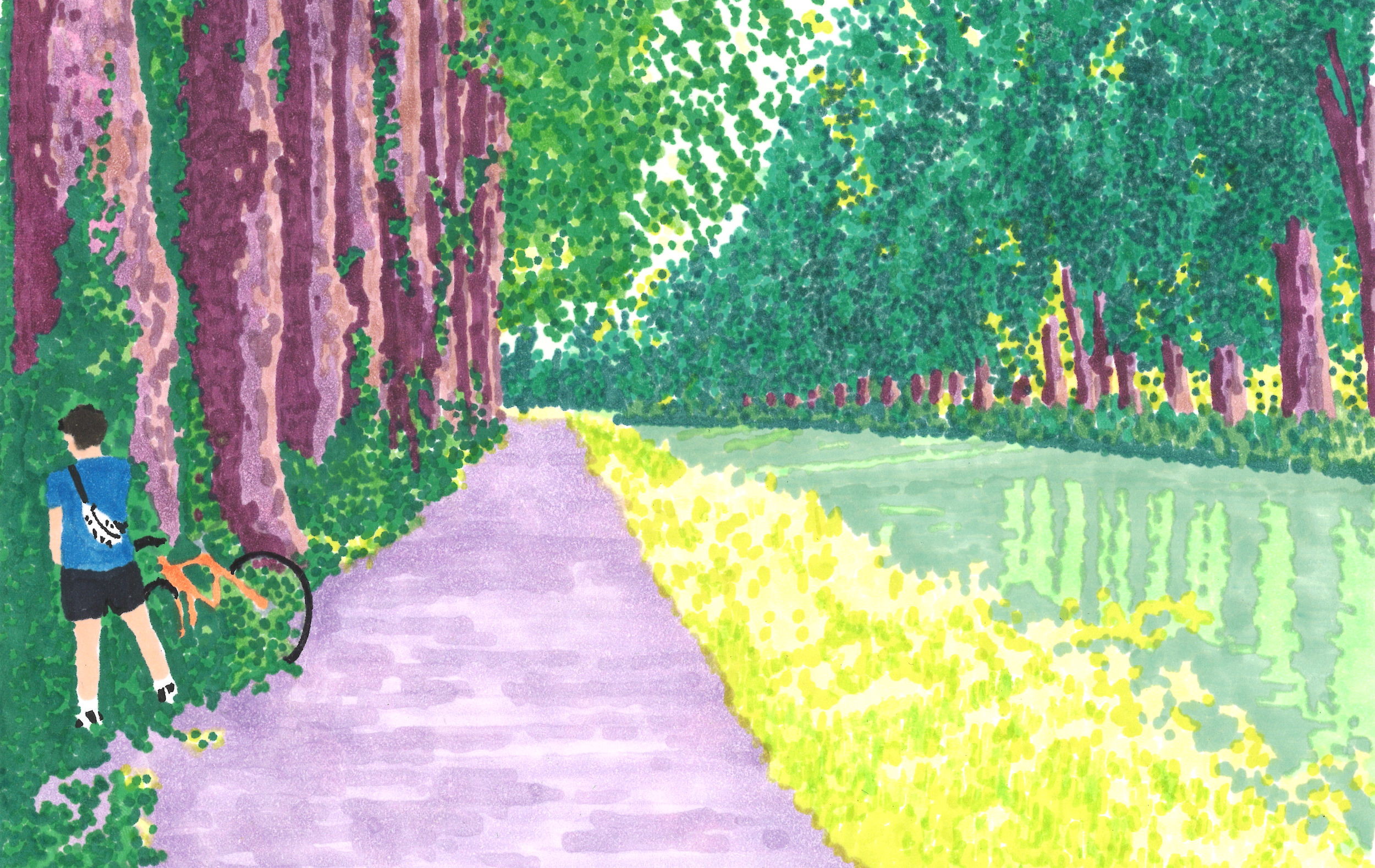
On vacation with Jeannie L #3
An artistic epic on bicycle Bordeaux - piste du canal latéral de la Garonne
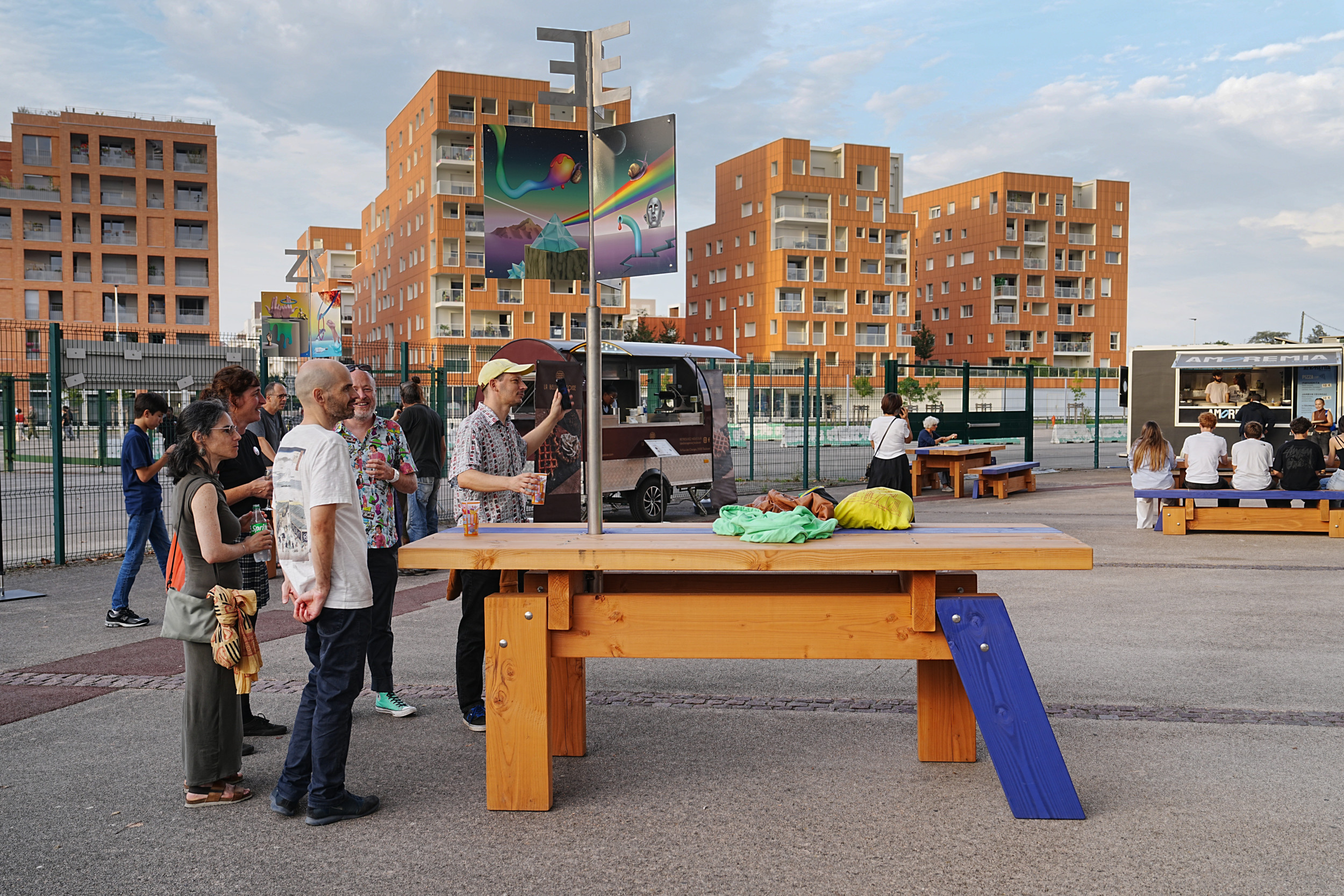
The Bancales
Zenith Toulouse Metropolis
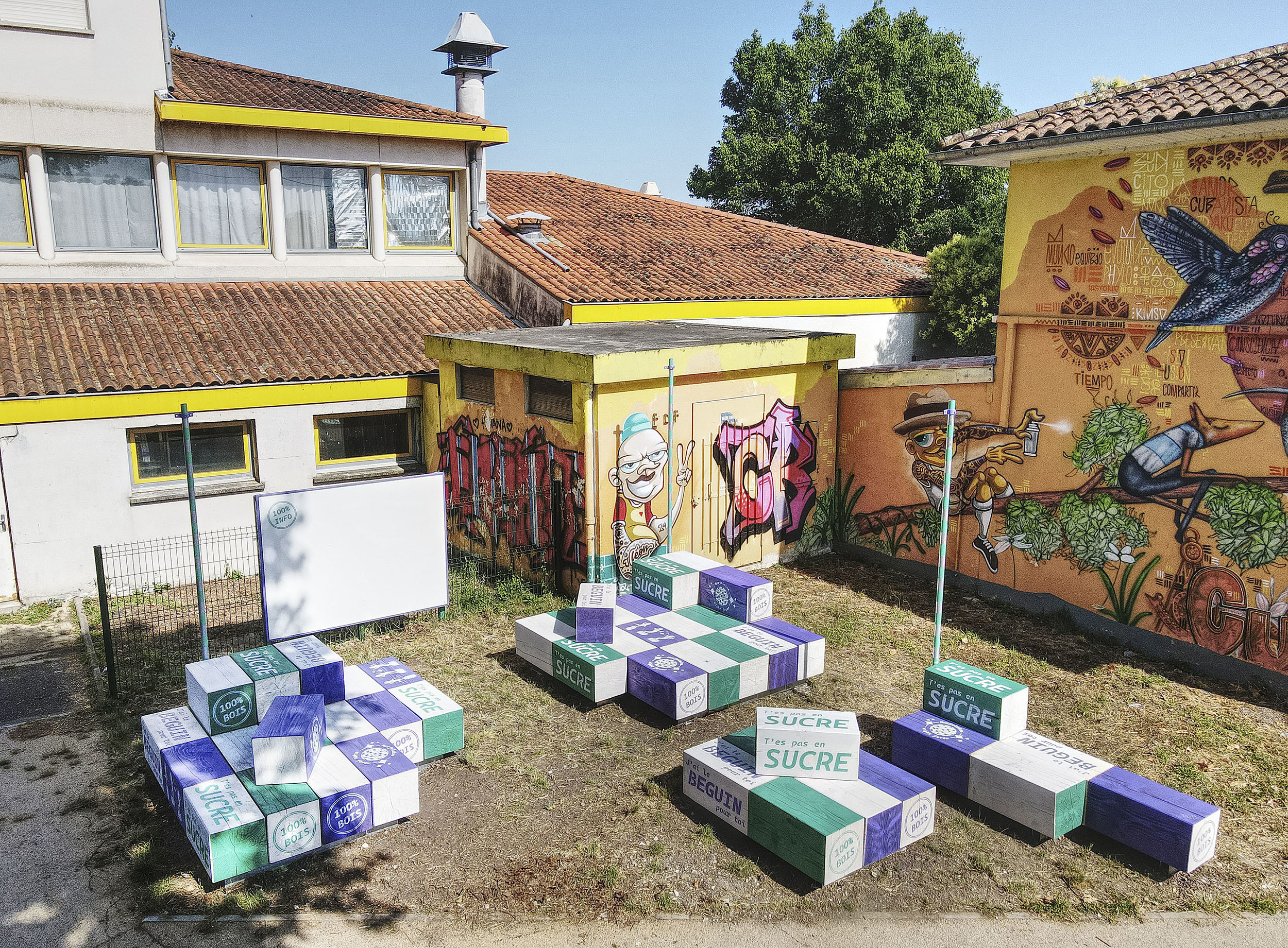
A crush on Marjolaine
Freedom pavilion "Bacalanhood" - Bordeaux
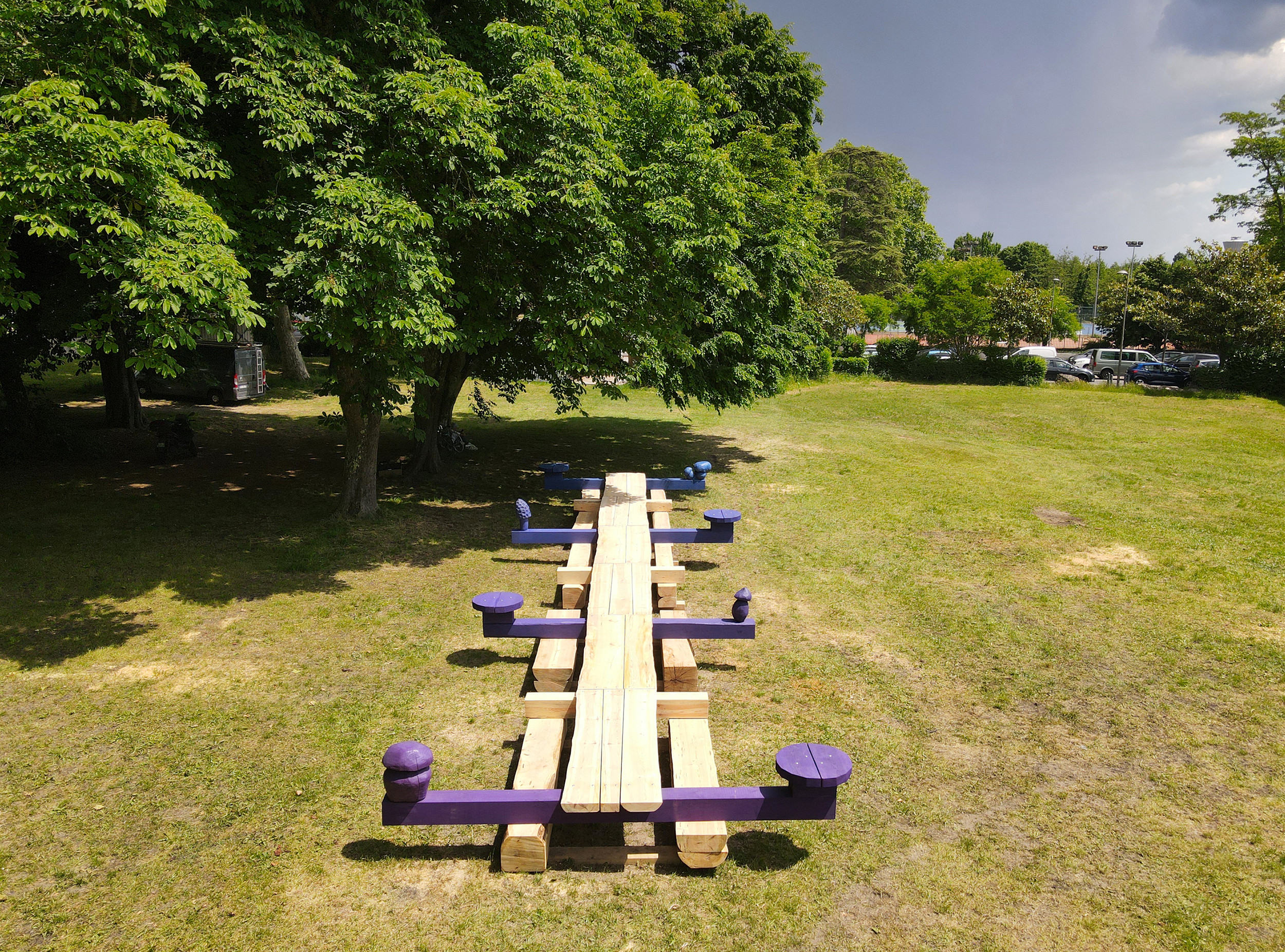
The Champicnic table
Pessac
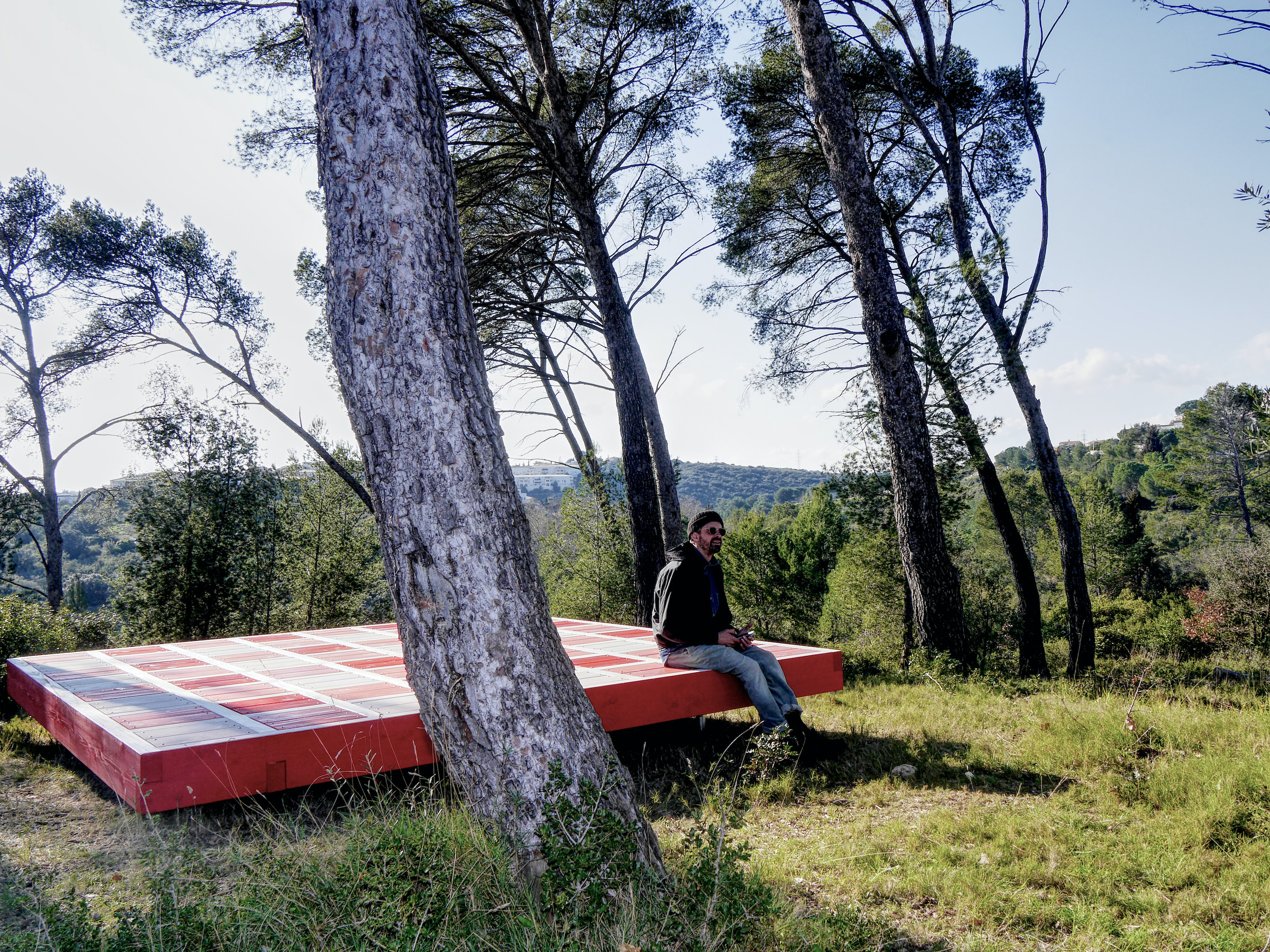
The Secret Balconies # 3 – The Pinède balcony
Montpellier

Common lands trail
Exhibition Nouvelles Saisons, arc en rêve centre d'architecture Bordeaux
